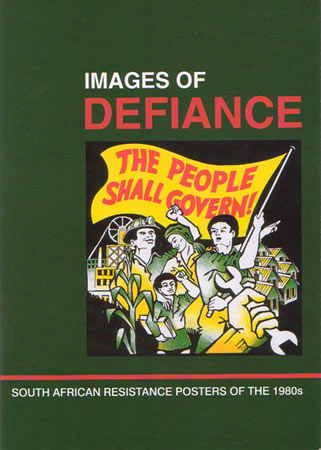
In looking at these posters produced by the democratic movement in the 1980s, I find I have to be very careful in commenting on them. This is our collective work, of which I am naturally very proud. It would therefore be very easy to exaggerate, to overstate my own feelings about them. Having said that, I nevertheless acknowledge feelings of great pride, that in spite of all the difficulties our people have had to face, they were able to produce such work. It is very encouraging, especially to people of my generation, to know that the ideas for which many of us have sacrificed are very much alive and embodied in this collection of posters.
Posters can be a very beautiful form of propaganda. They are a powerful way of conveying information, provided they are simple and to the point. And the posters issued by the democratic movement have been very effective. Of course, it was not possible, in prison, to keep pace with all the posters that were issued, but we were very aware of them. It was clear to us that a lot of material was being produced by people's organisations in our country.
One way in which we could see the effect of posters was the change in the perceptions and in the level of political consciousness of the young people who came to prison. We realised that the propaganda that was being issued in the form of posters and other material contributed a great deal to the sharpening of people's perceptions and developing their ability to articulate their ideas and aspirations.
Posters were used back in the 1950s too, but not to such a degree. There are now better facilities for producing them, and there is more expertise amongst the activists themselves. It's a continuation of the same tradition, but today poster propaganda has become much more part of our struggle than in the past.
In the future, in a new and post-apartheid society, the usefulness of posters will continue to be as great as it is at the present moment. This tradition will not come to an end merely because we are free. Moreover, the use of posters will not be confined to political organisations only. Other disciplines also rely on posters to get their messages across, and they will continue to do so.
Posters can be very useful as an educational medium in a society like ours. They may even have to be used much more than now, as a means of reaching the people on development issues like literacy, health and so on. Many people do not want to read long dissertations on issues that affect their lives. They would like to see something that is brief and to the point, something to keep in the memory, take home and act on. Posters fulfil that demand very well.
The 1980s was the decade of poster production in South Africa. This book is a welcome contribution, recording as it does this important element in the history of our struggle.
Nelson Rolihlahla Mandela
* 1991 edition


